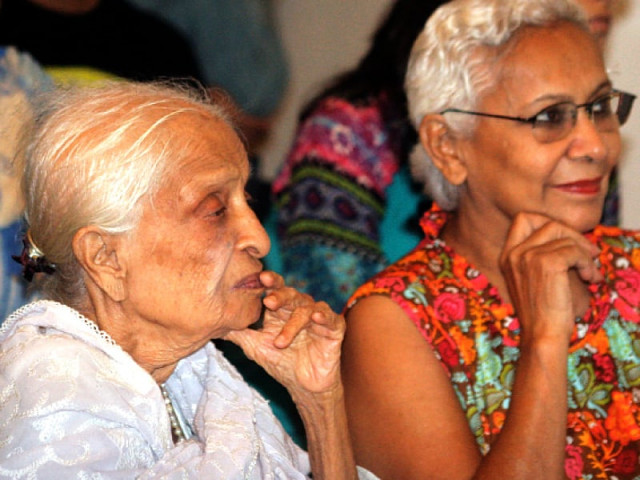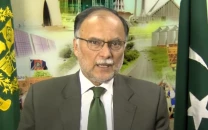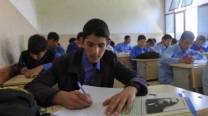Connecting youth: As tempers run high at the border, India and Pakistan find ways to take the high road
Baatcheet, a dialogue initiative between Pakistan, India, was launched on Aug 14.

Fatima Surayya Bajia, a renowned Urdu writer, at the launch of project Baatcheet, a dialogue initiative between Pakistanis and Indians, at T2F on Wednesday. PHOTO: ATHAR KHAN/EXPRESS
Amid the political air of mistrust and the resultant agitation, PeacheNiche and Tehelka is providing an oasis for Pakistanis and Indians to communicate freely. Baatcheet, an alternative platform allowing contact between citizens of the two neighbouring countries, was launched on Wednesday.
The first video conference started with “Happy Independence Day” wishes pouring in from New Delhi.
Sabeen Mahmud, the founder of PeaceNiche, said that she spoke to Kunal Majumder, assistant editor at Tehelka, about the need to have an alternative platform to promote communication between the people of two nations, during her visit to India. “It is not that the dialogue is not happening. It is happening, but at the state level and in an atmosphere of chaos,” said Mahumd, adding that, “Baatcheet allows communication without physically crossing boundaries. It is a chance to start a new narrative, away from the fractured history shared between the two nations.”
She said that this was an effort for Pakistan and India to get together and try to look beyond partition and pain. “There are countless possibilities of collaboration.”
Baatcheet currently comprises two projects, the Campus Connection and the Skype Dosti project.
Campus connection
Under the project, over 40 students from the media and visual arts department of Karachi University collaborated with the convergent journalism students of AJK Mass Communication Research Centre, Jamia Millia Islamia, New Delhi. The one-month communication was initiated in early 2013 over Facebook, Twitter, and email.

Obaid Siddiqui, the director of AJK Mass Communication Research Centre at Jamia Millia Islamia, said: “The interest of the new generation in such communication exhibits their desire to understand the political situation.”
“Pakistan and India have shared a history but are both individual identities. We need a competitive spirit instead of an air of enmity,” Siddiqui further added.
Durriya Kazi, the head of visual arts department at Karachi University, said: “The informality of communication makes it very real because the media portrayal of the bordering nation is distant and political.”
“Students can connect via Facebook without any monitoring. This promotes the exchange of actual knowledge. They do not only want to know about each other, but want to maintain this connection.”
Kaza appreciated the efforts of PeaceNiche to provide an effective mode of communication, “People want to tell stories. Baatcheet provides an unofficial platform to be expressive.”
Umair Nasir Ali, coordinator at Karachi University’s media department, said: “The students’ projects are focused on common elements in Delhi and Karachi. They have composed four volumes of photojournalism magazines and documentaries.”
Ali said: “India and Pakistan share a major factor that is the use of common language. This is the reason why students were able to do a project on Gulzar’s poem, whilst adopting the title, “Khaab Martey Nahi,” from Pakistani poet Faraz.”
“We chose to do a photo essay on Cantt Station Karachi as the same trains from the time of partition are still running, which is also the case in India,” a KU student told the audience.
Another KU student talked about the progress of his friendship with a student from Jamia Millia Islamia. “I was surprised how the media misrepresents the situation. Rohit and I had so much in common. Our views are the same on so many issues, which is why we are friends.”
Skype Dosti project
This project connected ten teenagers aged between 12-19 from both Pakistan and India on Skype and gave them an opportunity to share their stories. Teens from different classes and backgrounds connected and built relationships.
Shubhadra Kamath, facilitator of the project from the Tehelka Foundation, said: “The common topics discussed during the Skype project were home, school, hobbies and aspirations. Surprisingly, many of their experiences were shared and it was a lively interaction. “We aim to do this on a regular basis.”
Baatcheet shows unflinching commitment
Baatcheet’s next project to bring together musicians from India and Pakistan “to sing the same lyrics and showcase their renditions,” Mahmud stressed.
The founder of PeacheNiche invited everyone to pitch in an idea for Baatcheet future projects. “If journalists or media want to hold a dialogue with journalists across the border, we will stage a platform to start the dialogue.”
Majumder concluded the video conference by saying: “Future is in the hands of youth and they understand the importance of dialogue.”
Campus projects and the Skype dosti projects are available at: www.baatcheet.net
An anthology of 12 short stories written by Indian and Pakistani writers and published by Indireads was available on August14 at T2F. The book was launched during a transatlantic video conference as Tehleka joined from India, PeaceNiche from Pakistan and Naheed Hassan from Canada.
Hassan, the book’s editor, said: “These days words travel faster than voices and persons. The stories represent our efforts to embrace each other’s differences and similarities.”
During the book launch, story excerpts were read by two Pakistani writers, Mamun Adil and Zaffar Junejo, and two Indian writers, Andy Paula and Parul Tyagi.
“The long Interval”, a story by Junejo, addressed the importance of social platforms such as Facebook to connect people beyond borders. The writer works at Thardeep Rural Development Programme, an NGO which aims to change the lives of Thar residents.
Mamun Adil, a Karachi-based writer, read his story, “That 70s Babe.” He said: “The stories are trying to take the focus away from Partition literature. They are set in today’s time. In the stories, people connect despite the preconceived notions about each other.”
Adil said: “Our neighbouring country is seen as an enemy, but this book is a small step to promote peace and friendship and celebrate shared elements.”
The anthology is published as an e-book and is available for free download at: www.loveacrossborders.org
Published in The Express Tribune, August 16th, 2013.



















COMMENTS
Comments are moderated and generally will be posted if they are on-topic and not abusive.
For more information, please see our Comments FAQ